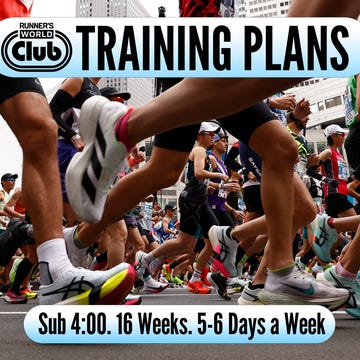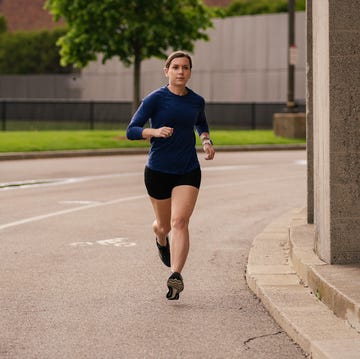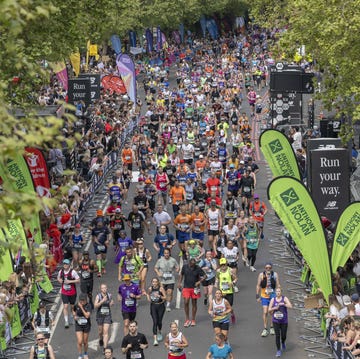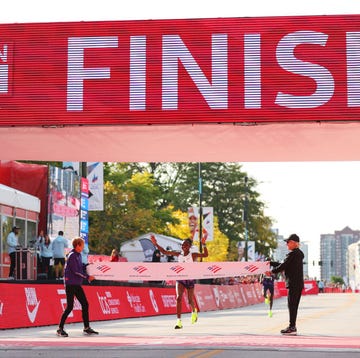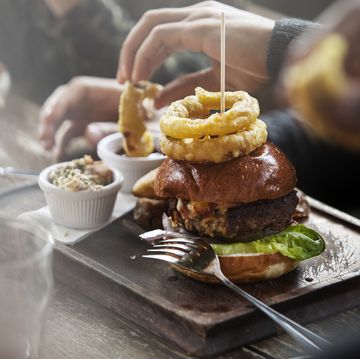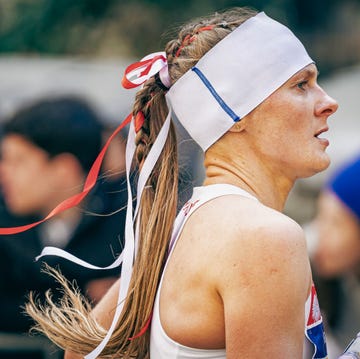If there's one woman you want a pep talk from ahead of the London Marathon, it's Paula Radcliffe. Twenty years ago, she set the woman's marathon world record in a time of 2:15:25. It was a record that would stand for 16 years, until it was finally broken in 2019.
Ahead of Sunday's race, we caught up with the former world record holder at Nike HQ to pick her brains on all things Blackheath to The Mall.
Before the race
1. Eat your carbs and stay hydrated
‘From Thursday night, I’d prioritise carbs but still have protein and veg in my meals,’ Paula says. ‘Then I’d add on carbs in the form of a drink: one on Thursday morning and night, the same on Friday and Saturday, and then one with breakfast on Sunday morning.’ To lock glycogen into your muscles you need to stay hydrated, says Paula. ‘[So] mixing the two together is logical and I'd find I'd get less bloated from a drink.'
What everyone's reading
2. Plan, plan, plan
Even the elites love a flat lay. ‘I used to lay everything out the night before, just to make sure,’ says Paula. ‘It also cuts down on the stress from the morning when you’re all nervous.’
And if you struggle to sleep the night before, don’t stress about it — even Paula used to experience pre-race insomnia. ‘My dad would say as long as you’ve slept well all week, that’s what matters. It’s not like you’re trying to recover from hard training because you’ve eased down [during taper].’
On race day
3. Keep a lid on your pace for the first few miles
You should ‘absolutely have a race plan’, says Paula, even if that plan is simply to go out and enjoy it.
For those aiming for a time, she always found negative splits easier to run. ‘But it’s harder in the first half so trying to hold yourself back is going to be tough.’ She suggests using the crowds in the first few miles. ‘Don’t waste energy zig zagging – use the blockage not to stress’.
If you do go out too quickly, don’t stress either – particularly if you’ve sped up on the downhill at mile three. ‘Think of mile three as one for free,’ says Paula.
4. Use coping techniques from your training runs
‘Everybody’s got their little techniques that they’ve used in training to get through those difficult sessions. I used to count to 100, then count to 100 again – it was really that simple. With that number in my head, I’m not thinking about what’s hurting. I’m not thinking about how far I have to go. I’m not even thinking about the next mile, I’m just in the mile.’
She says it’s important to go into the marathon knowing that there are going to be difficult parts – and usually more than one. ‘But there are going to be some great bits as well,’ she says. ‘You’ve got to really use your techniques to get through those bits and then you’ll be able to move on.’
5. If the race isn’t going your way: distract yourself
‘It’s all about distraction and making the most of it,’ says Paula. ‘Using what you can, whether that’s visualising the race in your mind, counting or something else.’
‘I think the other thing with London is that you’ve got to use the crowds and the atmosphere,’ she says. ‘Also the people around you, because they will massively help you get through those tough times.’
6. Good pain vs bad pain
If things start to hurt, make sure you can differentiate between good pain and bad pain. ‘If it’s good pain, it’s a good thing,’ says Paula. ‘You take it on, it’s like a rival’. Bad pain could indicate a bigger problem, in which case you may need to ease up on the pace.
After the race
7. Take the confidence you’ve gained
Post-marathon blues are common after a big event. So how did Radcliffe cope after setting her 2003 world record? ‘It was just like a really quiet, serene satisfaction, rather than a huge high and then a big comedown,’ she says. ‘It’s like a confidence too – take that for the next one.’
8. Be proud of what you’ve achieved
Remember: running 26.2 miles is a huge feat. Don’t let anyone take away from your achievement. ‘[After London], people said I could have gone much quicker at Berlin.' says Paula. ‘But the London course for me was worth so much.’


